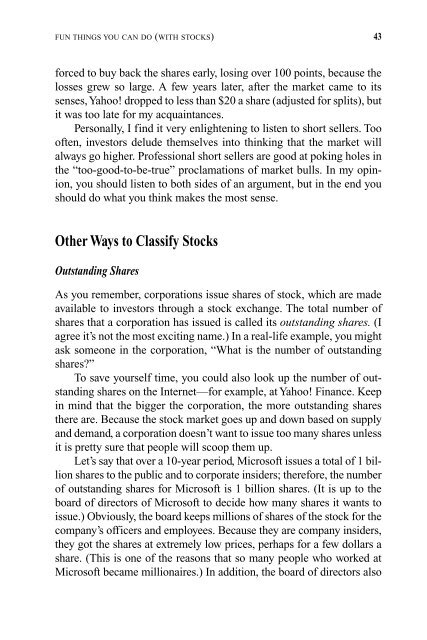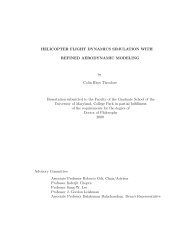Understanding Stocks
Understanding Stocks
Understanding Stocks
Create successful ePaper yourself
Turn your PDF publications into a flip-book with our unique Google optimized e-Paper software.
FUN THINGS YOU CAN DO (WITH STOCKS) 43<br />
forced to buy back the shares early, losing over 100 points, because the<br />
losses grew so large. A few years later, after the market came to its<br />
senses, Yahoo! dropped to less than $20 a share (adjusted for splits), but<br />
it was too late for my acquaintances.<br />
Personally, I find it very enlightening to listen to short sellers. Too<br />
often, investors delude themselves into thinking that the market will<br />
always go higher. Professional short sellers are good at poking holes in<br />
the “too-good-to-be-true” proclamations of market bulls. In my opinion,<br />
you should listen to both sides of an argument, but in the end you<br />
should do what you think makes the most sense.<br />
Other Ways to Classify <strong>Stocks</strong><br />
Outstanding Shares<br />
As you remember, corporations issue shares of stock, which are made<br />
available to investors through a stock exchange. The total number of<br />
shares that a corporation has issued is called its outstanding shares. (I<br />
agree it’s not the most exciting name.) In a real-life example, you might<br />
ask someone in the corporation, “What is the number of outstanding<br />
shares?”<br />
To save yourself time, you could also look up the number of outstanding<br />
shares on the Internet—for example, at Yahoo! Finance. Keep<br />
in mind that the bigger the corporation, the more outstanding shares<br />
there are. Because the stock market goes up and down based on supply<br />
and demand, a corporation doesn’t want to issue too many shares unless<br />
it is pretty sure that people will scoop them up.<br />
Let’s say that over a 10-year period, Microsoft issues a total of 1 billion<br />
shares to the public and to corporate insiders; therefore, the number<br />
of outstanding shares for Microsoft is 1 billion shares. (It is up to the<br />
board of directors of Microsoft to decide how many shares it wants to<br />
issue.) Obviously, the board keeps millions of shares of the stock for the<br />
company’s officers and employees. Because they are company insiders,<br />
they got the shares at extremely low prices, perhaps for a few dollars a<br />
share. (This is one of the reasons that so many people who worked at<br />
Microsoft became millionaires.) In addition, the board of directors also

















